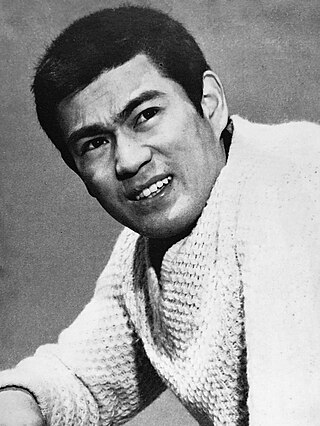
Shinichi Chiba, known internationally as Sonny Chiba, was a Japanese actor and martial artist. Chiba was one of the first actors to achieve stardom through his skills in martial arts, initially in Japan and later to an international audience.
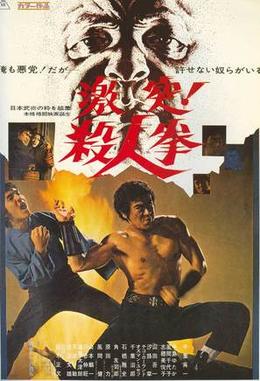
The Street Fighter is a 1974 Japanese martial arts film produced by Toei Company, directed by Shigehiro Ozawa, and starring Sonny Chiba. It was released in the United States by New Line Cinema and became one of the first films to be a commercial success for the distributor. It is notable as the first film to receive an X-rating in the US solely for violence.
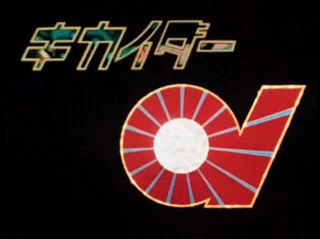
Kikaider 01, is a tokusatsu superhero TV series, and a sequel series to Android Kikaider. Produced by Toei Company and Ishimori Productions, it was broadcast on NET from May 12, 1973 to March 30, 1974, with a total of 46 episodes. Its title in Hawaii is Kikaida 01.

Hikari Sentai Maskman is a Japanese Tokusatsu television show and Toei's eleventh entry of the Super Sentai metaseries. It aired on TV Asahi from February 28, 1987, to February 20, 1988, replacing Choushinsei Flashman and was replaced by Choujyu Sentai Liveman with a total of 51 episodes. Its international English title as listed by Toei is simply Maskman.

Champion Of Death, also known as Karate Bullfighter, is a Japanese martial arts film made by the Toei Company in 1975. It was the first in a trilogy of films based on the manga Karate Baka Ichidai, a manga based on Masutatsu Oyama's life by Ikki Kajiwara, Jiro Tsunoda and Jōya Kagemaru. Sonny Chiba stars as his former master Oyama who was the founder of Kyokushin karate. Chiba would reprise this role in two more films Karate Bearfighter (1975), and Karate for Life (1977).

J.A.K.Q. Dengekitai, also known in the Philippines known as Lucky Aces, is a Japanese tokusatsu television show and the second installment in the Super Sentai metaseries. It aired from April 8 to December 23, 1977, replacing Himitsu Sentai Gorenger and itself being replaced by Battle Fever J. It was created by Shotaro Ishinomori and featured 35 episodes. It marks the first appearance of a White Ranger in the franchise. Toei distributes the series internationally under the title The Jackers.
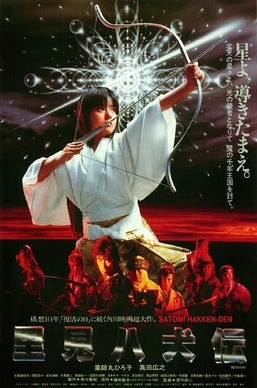
Legend of the Eight Samurai is a 1983 Japanese historical martial arts fantasy film directed by Kinji Fukasaku. The script is adapted from Toshio Kamata's 1982 novel Shin Satomi Hakkenden (新・里見八犬伝), itself a loose reworking of the epic serial Nansō Satomi Hakkenden by Kyokutei Bakin.

Golgo 13: Assignment Kowloon is a 1977 Japanese-language action thriller film starring Sonny Chiba as the international assassin Golgo 13. It is the second live-action movie based on the manga series Golgo 13, after the eponymous 1973 Japanese–Iranian film starring Ken Takakura.

The Street Fighter's Last Revenge originally titled in Japan as Gyakushū! Satsujin-ken is a 1974 martial arts film and the third in a series starting with The Street Fighter starring Sonny Chiba.
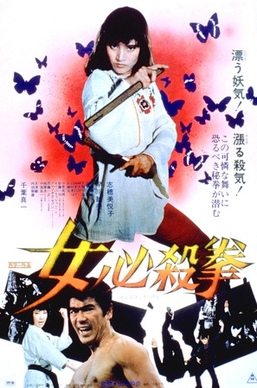
Sister Street Fighter, original titled in Japan as On'na Hissatsu-ken, also released in the United Kingdom as Revenge of the Dragon, also released in Germany as Die Karate Tiger is a spin-off of The Street Fighter (1974). The plot revolves around Lǐ Hóng-Lóng, the female martial artist of the title. When her brother Lǐ Wàn-Qīng is kidnapped by drug lords, she seeks revenge. The drug lord's colorful collection of "killers" includes a toga-clad group of Thai Boxers called the "Amazons Seven", along with representatives of almost every martial art. Hóng-Lóng breaks into the drug lord's compound with the help of Seiichi Hibiki and other members of the Shorinji Kempo dojo. After all of his minions are defeated, the drug lord himself battles Hóng-Lóng, wearing a steel claw in imitation of Han, the villain from Enter the Dragon (1973). This was the first in a trilogy of films. It was followed by Sister Street Fighter: Hanging by a Thread (1974) and The Return of the Sister Street Fighter (1975), each with Shihomi as star.

Etsuko Shihomi, now known by her married name Etsuko Nagabuchi, is a Japanese actress and martial artist who appeared in several Japanese martial arts films and samurai film and TV productions of the 1970s and 1980s.
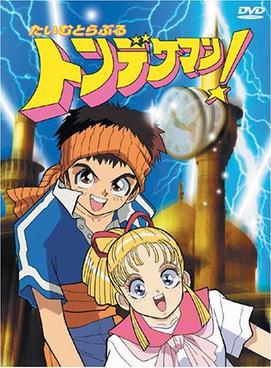
Time Travel Tondekeman is an anime series directed by Kunihiko Yuyama and Akira Sugino. It was written by Junki Takegami and produced by Masao Takiyama.
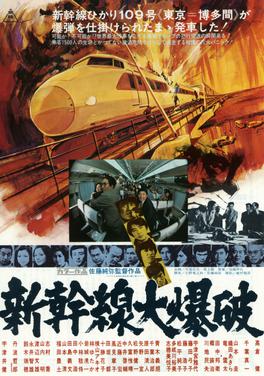
The Bullet Train is a 1975 Japanese action thriller film directed by Junya Satō and starring Ken Takakura, Sonny Chiba, and Ken Utsui. When a Shinkansen is threatened with a bomb that will explode automatically if it slows below 80 km/h unless a ransom is paid, police race to find the bombers and to learn how to defuse the bomb.

Sister Street Fighter: Hanging by a Thread is a Japanese martial arts directed by Kazuhiko Yamaguchi and starring Etsuko Shihomi. The film is a sequel to Sister Street Fighter. It was followed by a third and final film titled The Return of the Sister Street Fighter (1975).

The Return of the Sister Street Fighter is a 1975 Japanese martial arts film directed by Kazuhiko Yamaguchi and starred by Etsuko Shihomi. This film is a threequel to both Sister Street Fighter (1974) and Sister Street Fighter: Hanging by a Thread (1974).
Karate Warriors originally titled in Japan as Kozure Satsujin-ken is a 1976 Japanese martial arts film starring Sonny Chiba.
The Yagyu Conspiracy is a Japanese television jidaigeki that was broadcast from 1978 to 1979. It is adapted from the 1978 film Shogun's Samurai starring Sonny Chiba, who reprises his role in the series.

Bodigaado Kiba: Hissatsu sankaku tobi, also known as Bodyguard Kiba 2, is a 1973 Japanese martial arts film starring Sonny Chiba. It is the sequel to the earlier 1973 film Bodyguard Kiba based on an action manga by Ikki Kajiwara. Etsuko Shihomi makes her screen acting debut, replacing actress Yayoi Watanabe in the role of Naoto Kiba's sister Maki. Shihomi had previously worked as a stunt double for Watanabe in the earlier film Bodyguard Kiba. The movie is also considered a break-through for Masashi Ishibashi, who would be asked by Sonny Chiba to play a major role in the 1974 movie, The Street Fighter.
Jirō Yabuki also known as Jirō Chiba is a retired Japanese actor. His older brother was Sonny Chiba. He is known for playing the role of Kazuya Taki in the tokusatsu superhero series Kamen Rider.
Masashi Ishibashi, was a Japanese actor and martial artist. Ishibashi had an extensive career in Japanese television, where was famous as portraying villains in historical dramas, in roles such as bad lieutenants, shifty merchants, yakuza, bandits, and corrupt priests.
















